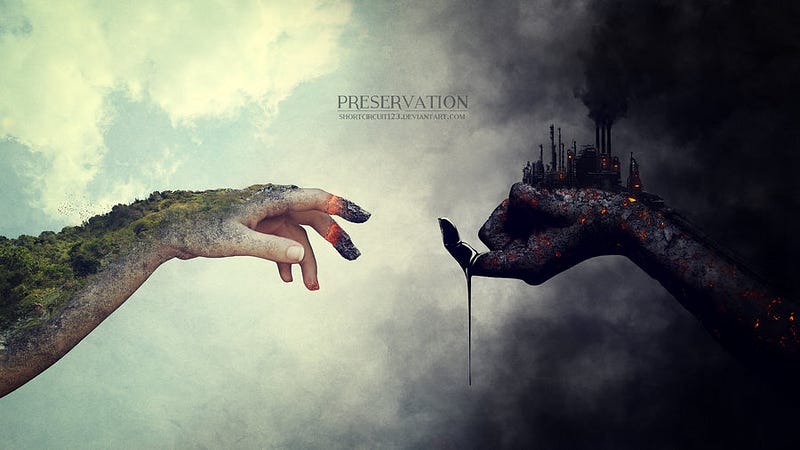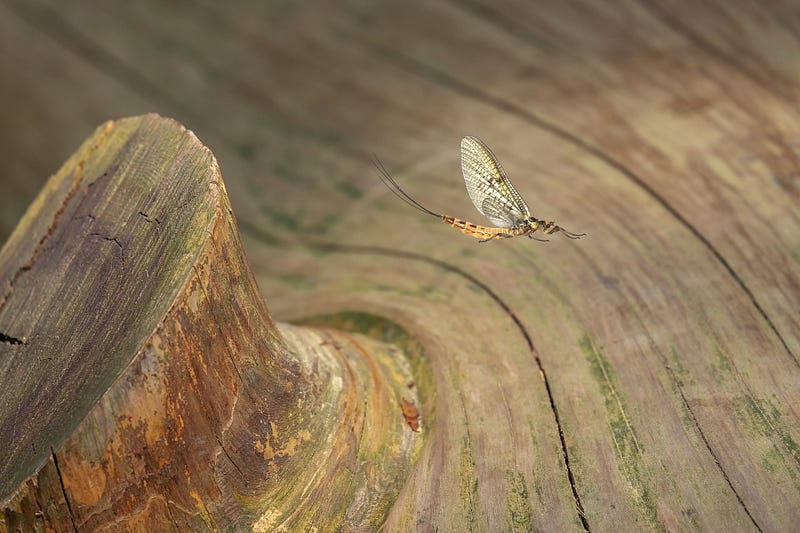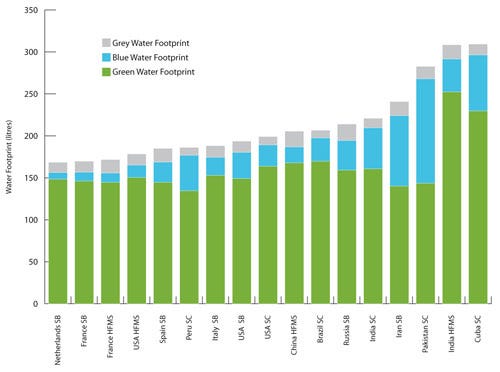
One of the reasons I write the Thursday Thought every week is to challenge our habitual assumptions and fermented paradigms and offer new ways of thinking through new information to form new connections.
One paradigm which we have been born into is an abundance of water paradigm. “The last 100 years has been the golden age of water in the developed world: water that has been safe, unlimited and essentially free” — Charles Fishman, author of “The Big Thirst”.
Although planet Earth is 75% covered by water, 97.5% of that (75%) water is salt water. This leaves us a mere 2.5% of freshwater to drink. Put another way, the total water on the surface of the planet makes up only 0.025% of Earths mass.
Despite the scarcity of this life-sustaining resource and the fact the World Health Organisation state that 80% of all diseases in the developing world are water related, we continue to use (and waste) 10 billion tons of freshwater worldwide every day.
In Ireland we use 123 litres (32 gallons) per person per day, 140 (37 gallons) in the UK and 375 in the US (99 gallons). 18.5 gallons of those 99 gallons in the US are used simply by flushing the toilet. We flush perfectly drinkable fresh water down the tubes.
The Mayfly, the Sequoia and Loss Aversion

Dr Robert Ballard tells the great story of a Mayfly, which only lives for four or five days, standing on the branch of a giant Sequoia tree, which lives for thousands of years.
If you were to ask the Mayfly, “Do you perceive this branch that you are standing on as being alive?” The Mayfly would say, “Of course not. I’ve been here my entire life, (four days), and the branch hasn’t done a doggone thing.”
Yet when you look at the tree in our broader context, it is very much alive.
I share this story of the Mayfly and the Sequoia because it is an illustration of our own fleeting time on Earth.
It makes you wonder, what will our generations be remembered for? Will we be the ones presiding over a state of ruin for our planet? This is imminent, the United Nations estimate by 2025, 30% of the world’s population in 50 countries will face water shortage.
To give context for overseas Thursday Thought readers, we are experiencing a rare heatwave in Ireland, which has resulted in a water shortage. Many Irish people are complaining because there is a hosepipe ban (I admit I grumbled myself as my hydrangeas look thirsty). Suddenly, we cannot water our plants or fill up our inflatable paddling pools to keep our kids cool.
If we were to pay to fill those inflatable pools, I figure it would cost us about €1,000, even with cheap own-brand supermarket water. I lived in London and France for 5 years and we all paid banded monthly rates, which included trash disposal and water rates. Because it was taken at source we never complained, we just baked it into living costs. There was no sense of loss. Just as Joni Mitchell said we don’t know what we’ve got ’til it’s gone!
In cognitive psychology and decision theory, loss aversion refers to our tendency to prefer avoiding losses to acquiring gains. In simple terms it seems better to us not to lose €5 than to gain €5.
This feeling of loss is partly our issue with water. We have been spoiled by having it in abundance and so we have taken it for granted.
Yes, we have been failed governmentally, but this is not a “Them” problem, it is a “We” problem and we have to proactively participate to make a change.
A Burning Platform

No matter what it is in life, we often do not act until it is too late. We are aware there is a burning platform, but until it impacts us personally, financially or emotionally in a meaningful way, we rarely act.
In life, we know we should go to the gym and eat well, but we act when we are told by a doctor, do this or face the consequences. Even still many of us ignore the professional advice and quite a number die.
In business, we know we are being disrupted but we do not face up to the brutal facts of our current situation, so we stick our heads in the sand and tell ourselves all will be fine.
Because we have an apparent abundance of water, we treat it like it has no value. When we assign no value, we squander.
You will have often heard the term “exponential growth”. The term is not just linked with growth, it is equally true for decline and for disruption. The following Gedanken experiment illustrates exponential change and the forthcoming Global water issues.
Exponential Change
Imagine you are sitting on the highest seat in Wembley stadium. On the pitch below, the match official drops a single drop of water on the pitch. After one minute she drops two more drops on the pitch. A minute later she doubles that and drops four. Each minute thereafter she doubles the number of drops.
Now, imagine the stadium was sealed so the water could not escape.
If the official continues to double the number of drops every minute, how long do you think it would take to flood Wembley?
From the very first drop, to completely filling the stadium it would take a mere 49 minutes!
Following is the really interesting question…
How long before do you think it would take for the water to reach the first seats beside the pitch and cover the heads of the people sitting there?
This part takes 45 of the 49 minutes.
That means by the time people realise there is a problem, the rest of the 90,000 people have only got 4 minutes to escape.
This is why our imminent water shortage will seem to come from nowhere. It will seem to happen all of a sudden. According to the U.N. this will happen in 2025.
Because we see water everywhere, because our experience is one of abundance it will blindside us.
The History of Lawns and Changing our Paradigm

In western civilisation we have grown accustomed to a house being accompanied by a front and back garden. The white-picket fence vision sold to us via socialisation.
The origin of the lawn is one of status, when only the wealthy could afford to maintain a beautiful patch of grass with water and cutting with a scythe. The poor and middle classes could not afford to spend time on land that did not pay them back. It was a waste of resource to use land on which they could grow crops or on which livestock could graze.
After the introduction of the lawn mower and the subsequent embedding of the social need for a lawn, the well-maintained plot of status grew widespread.
The history of the garden lawn highlights how do not question how certain customs, cultures or habits came to be. Why should things be a certain way? Why do they prevail? Because those who question them are often treated like the kid who called “The Emperor is Naked”, they are told to hush.

Las Vegas is adorned with beautiful water works, fountains and swimming pools, but Las Vegas is in the desert.
When Patricia Mulroy aka the Water Czar, took over as head of water for the city Las Vegas had an illusion of water abundance. Foreseeing the burgeoning crisis, Mulroy implemented a new way of doing things. As with any changemaker she was met with mass resistance. She encountered the loss aversion, which many of us will soon experience first hand.
Thanks to the work of Mulroy, Las Vegas paid residents $40,000 per acre to replace their water-dependent lawns with rocks and native heat-loving plants.
The Mop or The Tap?
Imagine you arrive home and your kitchen sink is overflowing. The tap is running and there is a mop leaning against the countertop. Do you start mopping furiously or do turn off the tap?
To deal with the water crisis, we need to both turn off the tap (excuse the pun) and deal with the source of the problem and mop up the many symptoms.
There is a perfect (dry) storm brewing and we need to prevent it together.
Some sobering figures will bring it to life.
How many litres of water do you think it takes to make 1 litre of Coca-Cola?
253!
3 for the liquid and 250 to grow the sugar cane!

We are experiencing a spectrum in society with a surge in obesity levels and sugar consumption = more sugar = more water for sugar cultivation = more addition to sugar and the cycle continues.
At the other end of the spectrum, we are experiencing a surge in health awareness with people leading healthier lifestyles, drinking more water and eating more fruit and vegetables = more water for food cultivation .
We ARE NOT HOWEVER experiencing a surge in awareness of the problem.
Are we teaching our children to conserve water? Are we teaching them to turn off the tap when brushing their teeth? Are we turning off the tap? Are we leading by example? Are we embedding better habits? Are we giving baths when showers will do?
It starts with us.
As recent guest on the Innovation show, social entrepreneur Gib Bulloch told us, corporations are like super tankers, getting them to change their course even slightly has an immense impact.
Imagine we were to all stop leaving the tap running, stop flushing when we don’t need to and became conscious of the small decisions we make every day?
If we don’t do something, Wembley stadium will not fill with water, because there will be no water left.
“Good and evil increase at compound interest. That’s why the little decisions we make every day are of infinite importance. the smallest good act today is the capture of a strategic point from which, a few months later, you may go on to victories you never dreamed of”. — C.S. Lewis
If you like this post please hit a Thumbs Up so others might be inspired to make some small collective changes for an immense impact
On this week’s innovation show we welcome Joanna Jast, the author of “Laser-Sharp Focus. A No-Fluff Guide to Improved Concentration, Maximised Productivity and Fast-Track to Success”. Most of us struggle with our attention, but more important is that we struggle to improve our attention.
We discuss:
What is focus, it has many meanings depending on context?
How does focus work?
The silver bullet myth to focus
the 2 types of attention: Automatic attention (8–12 seconds and Intentional attention Distraction logs?
Distraction patterns
How Motivation is short lived
Intrinsic and extrinsic motivation
Setting up a focus system
Environment
Workspace
Taking control of tech
Technology
Sleep — Sleep dept, recommended sleep, negative effects etc
Exercise
Managing energy not time
Find out more about Joanna here: http://www.theshapeshiftersclub.com/about
Check the show out here:
Soundcloud https://lnkd.in/gBbTTuF
Spotify http://spoti.fi/2rXnAF4
iTunes https://apple.co/2gFvFbO
Tunein http://bit.ly/2rRwDad
iHeart Radio http://bit.ly/2E4fhfl
